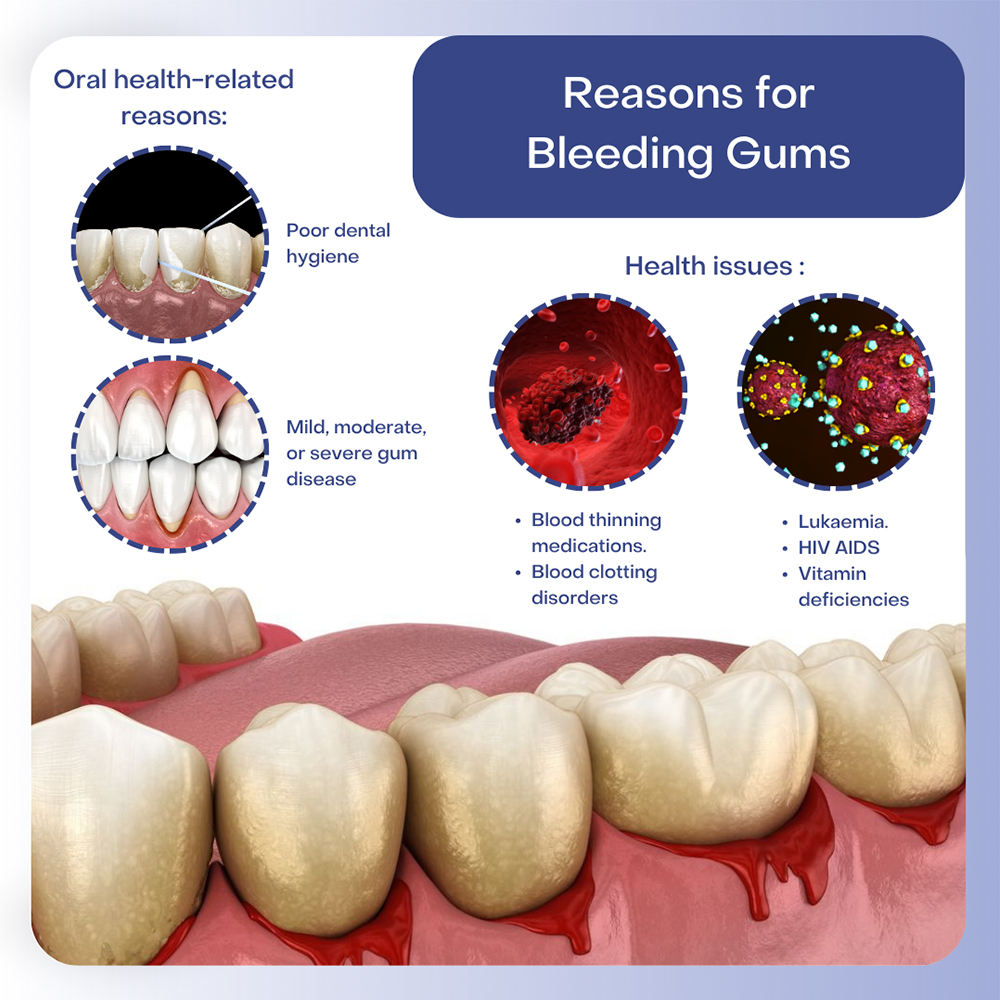Table of contents
In this article, we cover why gums can bleed, diagnosis and possible treatments, and how to treat bleeding gums at home. We also examine what happens if you ignore bleeding gums and how to prevent this dental condition.
Reasons for bleeding gums may be related to your dental health or overall health.
Oral health-related reasons include:
In addition to bleeding gums, there may be other symptoms, like noticing your gums have become red and swollen. They may hurt if you press them. You may have persistent bad breath or an unpleasant taste. Your gums could have started to pull away from your teeth, creating gaps called periodontal pockets.
Health issues that may cause bleeding gums include:

If you have noticed blood on your toothbrush or blood in the bathroom sink or that your gums bleed at other times schedule an appointment to come and see us. Our expert dentist can assess your gum health and determine if the cause is oral health-related. If so, we can provide appropriate treatment or recommend you see our periodontist, a gum specialist.
Generally, gums begin to bleed because of poor oral hygiene, which has resulted in gum disease. Treatments for gum disease can include the following:
Scaling and root planing is a deep dental cleaning, similar to a hygiene appointment, but which cleans tooth roots that have become exposed due to receding gums. You may need a course of treatment to help eradicate early signs of gum disease or to control advanced gum disease or periodontitis.
Gum disease is a bacterial infection, so antibiotics may be needed to help eliminate it. These antibiotics may be inserted topically into your gums after Scaling and root planing or other treatments. We may prescribe oral antibiotics and ask that you take the complete course.
Our periodontist will often prescribe laser treatment for gum bleeding. Treatment is gentle and very effective as the laser energy helps kill harmful bacteria, sterilizing areas treated so your gums can heal more easily.
If you have periodontitis, you may need periodontal surgery to remove gum tissue that is too badly damaged to heal and to help reduce the size of the periodontal pockets, which are the gaps between your teeth and gums. Treatment will help your gums fit more snugly, and as they become healthier, they will stop bleeding.
A good oral hygiene routine at home is essential to stop bleeding gums. When you see our dentist and hygienist, they can review your oral care routine with you carefully and make useful suggestions on how to improve it.
Demonstrations on more effective brushing and flossing techniques can be extremely helpful, and we can discuss which tools to use and recommend certain dental products like toothpaste and mouth rinse. An antibacterial mouth rinse can be useful in treating mild gum disease.
A good oral hygiene routine should improve your gum health within two or three weeks. It is essential to stick to the routine even if your gums bleed initially. As they become stronger and healthier, they will bleed less frequently, and eventually, the bleeding will cease altogether.
If your gums are bleeding but you don’t have gum disease, we may recommend seeing your healthcare provider. You might need further testing to determine if you have any underlying health conditions or other problems like vitamin deficiencies. Your healthcare provider can then recommend suitable treatment.
People with medical issues that affect gum health, such as anyone with diabetes, may need to see us more frequently, as this condition increases the risk of gum disease.
Hormonal changes during pregnancy and at other times can also cause bleeding gums. This is because the increase in hormones increases the gum’s sensitivity to the bacteria that cause gum disease.
Treatments such as more frequent dental cleanings can help maintain healthy gums more easily and enable us to monitor your gum health closely and adjust your preventative dental care plan as needed.
Without a proper diagnosis and suitable treatment, bleeding gums can become worse, especially if you have untreated gum disease. Symptoms like bad breath will worsen, and eventually, teeth can become loose as gum disease destroys the tissues supporting them, including bone and ligaments.
A good preventive dental care routine can often maintain strong and healthy gums. Ensure you visit us regularly and practice good dental hygiene at home. However, sometimes, bleeding gums cannot be prevented if underlying medical issues are present.
If you see blood on your toothbrush, please don’t ignore this sign. Gingivitis, or early gum disease, is very treatable. You may need nothing more than a hygiene appointment and to spend a little more time brushing and flossing daily. Otherwise, if gingivitis worsens and becomes periodontitis, it’s much trickier to treat and can become chronic, requiring ongoing expert periodontal care.

My name is Victoria Kushensky. I am a general dentist dedicated to remaining at the forefront of my field. Combining compassionate care with extensive knowledge, I offer cosmetic and general dentistry services as well as advanced root canal treatments.
I earned my Doctor of Dental Surgery (DDS) degree from the esteemed New York University College of Dentistry. Throughout my career, I have honed my skills in various dental procedures, ensuring effective treatment for each patient’s unique needs. I prioritize patient comfort and understanding, taking the time to thoroughly explain procedures and address any questions.
More about Dr. KushenskyMy NJ Dentist: Victoria Kushensky, DDS
385 Prospect Ave Suite 304
Hackensack, NJ 07601
(201) 298-8000